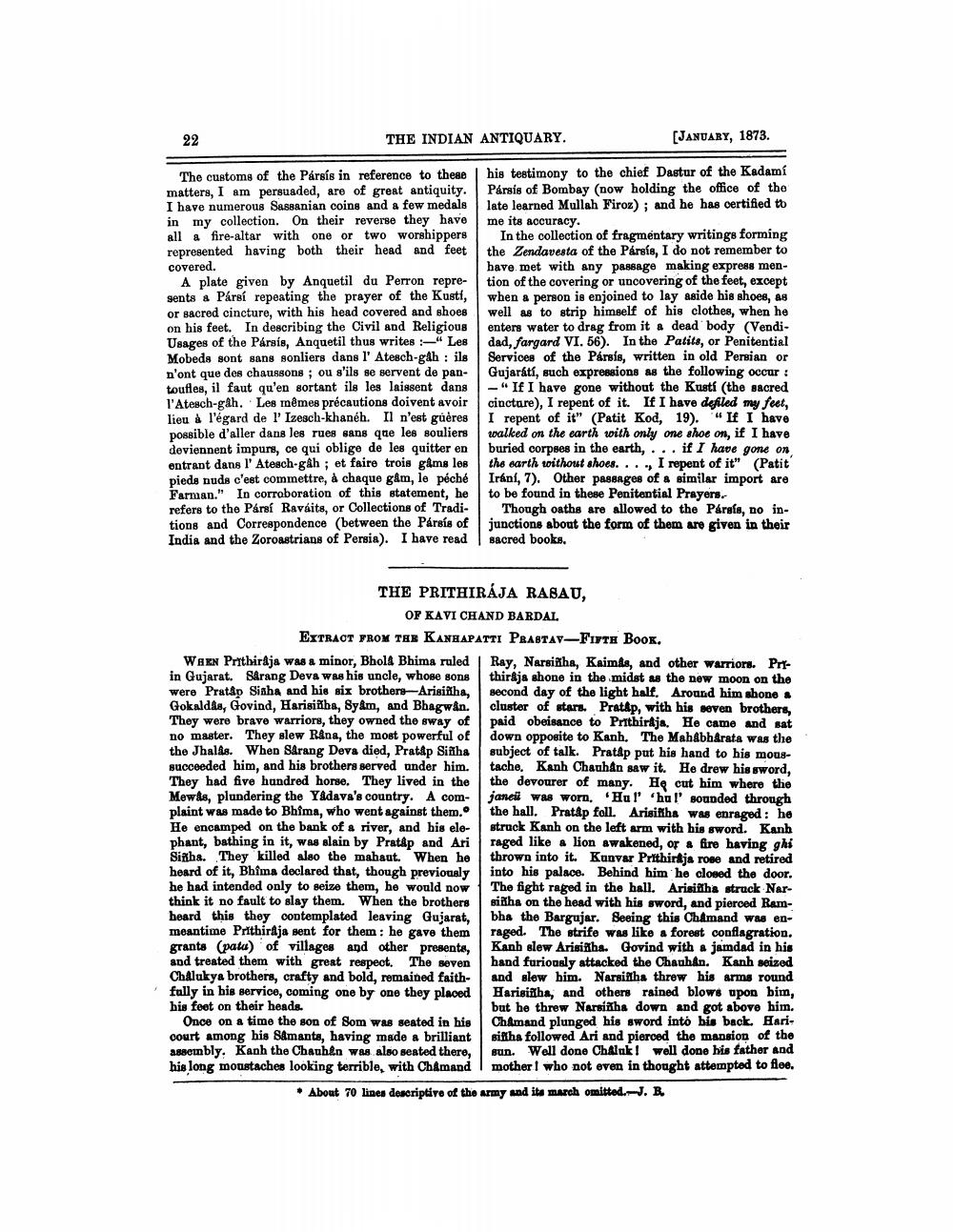________________
22
THE INDIAN ANTIQUARY.
The customs of the Pársís in reference to these matters, I am persuaded, are of great antiquity. I have numerous Sassanian coins and a few medals in my collection. On their reverse they have all a fire-altar with one or two worshippers represented having both their head and feet covered.
A plate given by Anquetil du Perron represents a Pársí repeating the prayer of the Kusti, or sacred cincture, with his head covered and shoes on his feet. In describing the Civil and Religious Usages of the Pársís, Anquetil thus writes :-" Les Mobeds sont sans sonliers dans l' Atesch-gâh : ils n'ont que des chaussons; ou s'ils se servent de pantoufles, il faut qu'en sortant ils les laissent dans l'Ateach-gâh. Les mêmes précautions doivent avoir lieu à l'égard de l' Izesch-khanéh. Il n'est guères possible d'aller dans les rues sans que les souliers deviennent impurs, ce qui oblige de les quitter en entrant dans l' Atesch-gâh ; et faire trois gåms les pieds nuds c'est commettre, à chaque gâm, le péché Farman." In corroboration of this statement, he refers to the Pársí Raváits, or Collections of Traditions and Correspondence (between the Pársís of India and the Zoroastrians of Persia). I have read
[JANUARY, 1873.
his testimony to the chief Dastur of the Kadamí Pársis of Bombay (now holding the office of the late learned Mullah Firoz); and he has certified to me its accuracy.
Once on a time the son of Som was seated in his court among his Samants, having made a brilliant assembly. Kanh the Chauhan was also seated there, his long moustaches looking terrible, with Châmand
In the collection of fragmentary writings forming the Zendavesta of the Pársís, I do not remember to have met with any passage making express mention of the covering or uncovering of the feet, except when a person is enjoined to lay aside his shoes, as well as to strip himself of his clothes, when he enters water to drag from it a dead body (Vendidad, fargard VI. 56). In the Patits, or Penitential Services of the Pársís, written in old Persian or Gujarátí, such expressions as the following occur: -"If I have gone without the Kustí (the sacred cincture), I repent of it. If I have defiled my feet, I repent of it" (Patit Kod, 19). "If I have walked on the earth with only one shoe on, if I have buried corpses in the earth,... if I have gone on, the earth without shoes. . . ., I repent of it" (Patit Irání, 7). Other passages of a similar import are to be found in these Penitential Prayers.
Though oaths are allowed to the Pársís, no injunctions about the form of them are given in their sacred books.
THE PRITHIRÁJA RASAU,
OF KAVI CHAND BARDAL
EXTRACT FROM THE KANHAPATTI PRASTAV-FIFTH BOOK.
WHEN Prithiraja was a minor, Bhola Bhima ruled | Ray, Narsinha, Kaimas, and other warriors. Pry
in Gujarat. Sarang Deva was his uncle, whose sons were Pratap Sinha and his six brothers-Arisiйha, Gokaldas, Govind, Harisiñha, Syam, and Bhagwan. They were brave warriors, they owned the sway of no master. They slew Rana, the most powerful of the Jhalas. When Sarang Deva died, Pratap Sinha succeeded him, and his brothers served under him. They had five hundred horse. They lived in the Mewâs, plundering the Yadava's country. A complaint was made to Bhima, who went against them. He encamped on the bank of a river, and his elephant, bathing in it, was slain by Pratap and Ari Sinha. They killed also the mahaut. When he heard of it, Bhima declared that, though previously he had intended only to seize them, he would now think it no fault to slay them. When the brothers heard this they contemplated leaving Gujarat, meantime Prithiraja sent for them: he gave them grants (pata) of villages and other presents, and treated them with great respect. The seven Chalukya brothers, crafty and bold, remained faithfully in his service, coming one by one they placed his feet on their heads.
thiraja shone in the midst as the new moon on the second day of the light half. Around him shone a cluster of stars. Pratap, with his seven brothers, paid obeisance to Prithiraja. He came and sat down opposite to Kanh. The Mahabharata was the subject of talk. Pratap put his hand to his moustache. Kanh Chauhan saw it. He drew his sword, the devourer of many. He cut him where the jane was worn. 'Hu!' 'hu!' sounded through the hall. Pratap foll. Arisiñha was enraged: he struck Kanh on the left arm with his sword. Kanh raged like a lion awakened, or a fire having ghi thrown into it. Kunvar Prithiraja rose and retired into his palace. Behind him he closed the door. The fight raged in the hall. Arisinha struck Narsiñha on the head with his sword, and pierced Rambha the Bargujar. Seeing this Chamand was enraged. The strife was like a forest conflagration. Kanh slew Arisinha. Govind with a jamdad in his hand furiously attacked the Chauhan. Kanh seized and slew him. Narsinha threw his arms round Harisiñha, and others rained blows upon bim, but he threw Narsinha down and got above him. Châmand plunged his sword into his back. Harisifths followed Ari and pierced the mansion of the sun. Well done Châluk! well done his father and mother! who not even in thought attempted to flee.
* About 70 lines descriptive of the army and its march omitted.-J. B.




